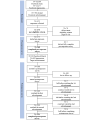Assessing the Feasibility of Studying Awareness of a Digital Health Campaign on Facebook: Pilot Study Comparing Young Adult Subsamples
- PMID: 36036974
- PMCID: PMC9468914
- DOI: 10.2196/37856
Assessing the Feasibility of Studying Awareness of a Digital Health Campaign on Facebook: Pilot Study Comparing Young Adult Subsamples
Abstract
Background: Mass media campaigns for preventive health messaging have been shown to be effective through years of research. However, few studies have assessed the effectiveness of campaigns on digital media, which is currently how youths and young adults are primarily consuming media. In particular, a platform that can accurately assess exposure to digital messaging in a real-life setting has yet to be developed.
Objective: This study examines the feasibility of a unique survey platform, Virtual Lab, to conduct a study on exposure to a media campaign within Facebook using a chatbot-style survey administration technique.
Methods: Virtual Lab is a survey platform that was used to recruit and survey participants within Facebook and Facebook Messenger, respectively. We created a Facebook business account with 2 Facebook pages: one for recruitment and disseminating the survey and the other one for serving the target advertisements. Pre- and postexposure surveys were administered via Facebook Messenger using a chatbot-style questionnaire 1 week apart. During this time, the target advertisements were shown to participants who completed the pre-exposure survey. The total time from recruitment to completion of the postexposure survey was 13 days, and incentive costs were US $10 per participant. Survey data were compared between those who completed both pre- and postexposure surveys and those who only completed the pre-exposure survey; that is, those who were lost to follow-up. The demographics of the complete cases were also compared to the US census data.
Results: A total of 375 Facebook users aged between 18 and 24 years met eligibility requirements and consented to the study, which consisted of complete cases (n=234) and participants lost to follow-up (n=141). A few differences between complete cases and participants lost to follow-up were observed. Regarding gender, complete cases comprised 40.2% males and 59.4% females, and among participants lost to follow-up, 44.0% were male and 50.4% were female (P=.003). Differences were also observed for e-cigarette use status, where a greater number of current users and fewer past and never users were lost to follow-up than complete cases (P=.01).
Conclusions: The use of Virtual Lab yielded a diverse sample quickly and cost-effectively. Demographic characteristics of participants who completed the study and those who were lost to follow-up were similar, indicating that no biases were caused by the platform during recruitment or testing. This study suggests the feasibility of the Virtual Lab survey platform for studies of media campaign exposure within Facebook. This platform can advance health campaign research by providing more accurate data to inform digital messaging.
Keywords: Facebook; campaign evaluation; digital media; health campaign; health communications; outcome evaluation; social marketing; tobacco control and policy; young adults; youth.
©Shreya Tulsiani, Megumi Ichimiya, Raquel Gerard, Sarah Mills, Jeffrey B Bingenheimer, Elizabeth C Hair, Donna Vallone, W Douglas Evans. Originally published in JMIR Formative Research (https://formative.jmir.org), 29.08.2022.
Conflict of interest statement
Conflicts of Interest: None declared.
Figures
Similar articles
-
Beyond Traditional Newspaper Advertisement: Leveraging Facebook-Targeted Advertisement to Recruit Long-Term Smokers for Research.J Med Internet Res. 2016 Jun 15;18(6):e117. doi: 10.2196/jmir.5502. J Med Internet Res. 2016. PMID: 27306780 Free PMC article.
-
Using Social Media to Recruit a Diverse Sample of Participants for a Mobile Health (mHealth) Intervention to Increase Physical Activity: Exploratory Study.JMIR Mhealth Uhealth. 2025 Apr 28;13:e56329. doi: 10.2196/56329. JMIR Mhealth Uhealth. 2025. PMID: 40294424 Free PMC article. Clinical Trial.
-
Using Paid and Free Facebook Methods to Recruit Australian Parents to an Online Survey: An Evaluation.J Med Internet Res. 2019 Mar 6;21(3):e11206. doi: 10.2196/11206. J Med Internet Res. 2019. PMID: 30839282 Free PMC article.
-
Recruiting Hard-to-Reach Populations for Survey Research: Using Facebook and Instagram Advertisements and In-Person Intercept in LGBT Bars and Nightclubs to Recruit LGBT Young Adults.J Med Internet Res. 2018 Jun 18;20(6):e197. doi: 10.2196/jmir.9461. J Med Internet Res. 2018. PMID: 29914861 Free PMC article.
-
Review of Evaluation Metrics Used in Digital and Traditional Tobacco Control Campaigns.J Med Internet Res. 2020 Aug 11;22(8):e17432. doi: 10.2196/17432. J Med Internet Res. 2020. PMID: 32348272 Free PMC article. Review.
Cited by
-
Testing certain and uncertain incentives on study retention in a longitudinal social media survey among young adults: An embedded recruitment trial.Digit Health. 2025 May 21;11:20552076251336522. doi: 10.1177/20552076251336522. eCollection 2025 Jan-Dec. Digit Health. 2025. PMID: 40416076 Free PMC article.
-
Effects of a Social Media Intervention on Vaping Intentions: Randomized Dose-Response Experiment.J Med Internet Res. 2024 Mar 12;26:e50741. doi: 10.2196/50741. J Med Internet Res. 2024. PMID: 38470468 Free PMC article. Clinical Trial.
-
Digital Media for Behavior Change: Review of an Emerging Field of Study.Int J Environ Res Public Health. 2022 Jul 26;19(15):9129. doi: 10.3390/ijerph19159129. Int J Environ Res Public Health. 2022. PMID: 35897494 Free PMC article. Review.
References
-
- Wakefield MA, Loken B, Hornik RC. Use of mass media campaigns to change health behaviour. Lancet. 2010 Oct 09;376(9748):1261–1271. doi: 10.1016/S0140-6736(10)60809-4. https://europepmc.org/abstract/MED/20933263 S0140-6736(10)60809-4 - DOI - PMC - PubMed
-
- Best Practices for Comprehensive Tobacco Control Programs. Centers for Disease Control and Prevention. 2014. [2022-02-09]. https://www.cdc.gov/tobacco/stateandcommunity/best_practices/pdfs/2014/c... .
-
- Auxier B, Anderson M, Kumar M. 10 tech-related trends that shaped the decade. Pew Research Center. 2019. Dec 20, [2022-01-10]. https://www.pewresearch.org/fact-tank/2019/12/20/10-tech-related-trends-...
-
- Allen S. Social media's growing impact on our lives. American Psychological Association. 2019. Sep 20, [2022-01-10]. https://www.apa.org/members/content/social-media-research .
Grants and funding
LinkOut - more resources
Full Text Sources
Miscellaneous



